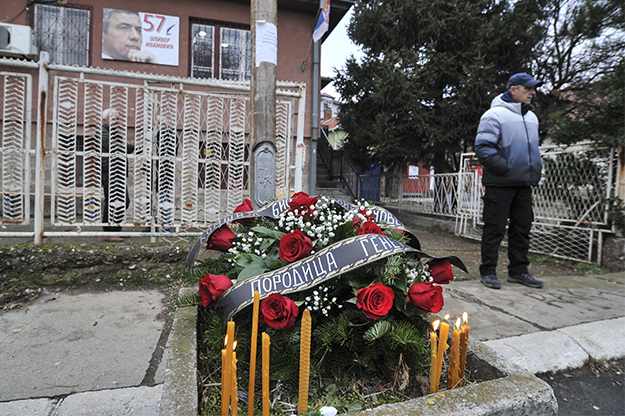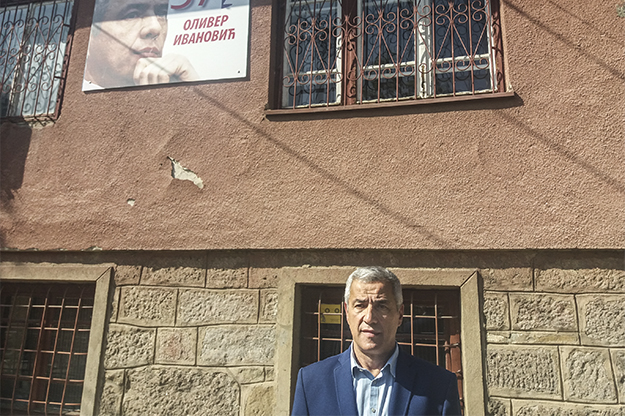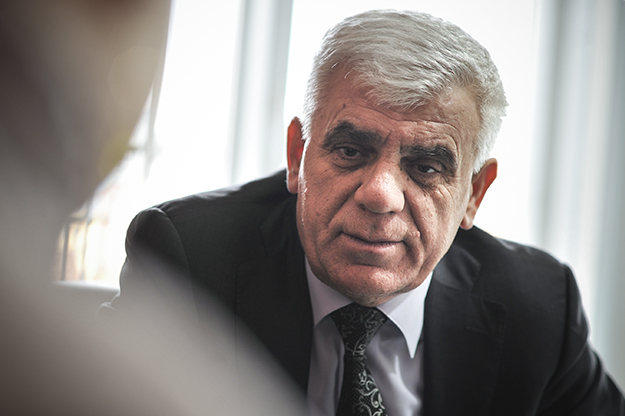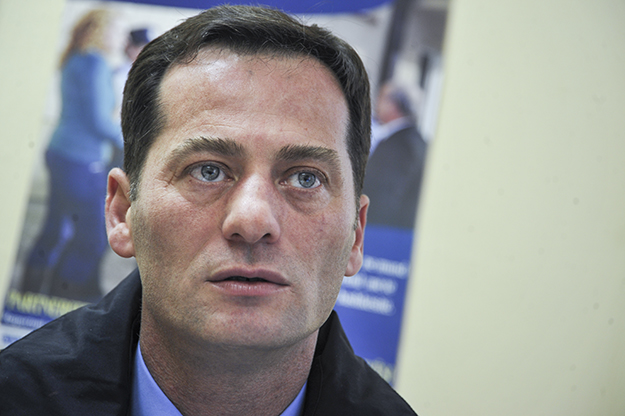On Jan. 16, at 8 a.m., a man was entering the offices of his political party when he was shot six times in the chest. He was seen, shot and bloodied, by a few pupils on Sutjeska Street in the north of Mitrovica in Kosovo.
The street is named after the Sutjeska river in southern Bosnia and Herzegovina and the famous battle, “the fifth enemy offensive,” that happened nearby in 1943, during World War II. The Axis powers, comprised of Germany, Hungary, Bulgaria and Italy, failed in a military operation, known as “Case Black” against Partisan Yugoslav forces led by Marshal Josip Broz Tito.
The battle became known as a turning point for Yugoslavia, its revival during the Partisans’ war against fascism.
From Jan. 16, Sutjeska can now be remembered as another turning point, one of cooperation between two communities that have a rancorous history, who came together to attempt to solve the case of a brutal murder of a 65-year-old man. The victim was Oliver Ivanović, the controversial leader of the largest Serb opposition party in Kosovo, the SDP Citizens’ Initiative.
Head prosecutor in Mitrovica, Shyqri Syla, described the crime, which left the politician dead, as one that was organized in a very professional way. According to Syla, the first five bullets were fired from a moving vehicle. The sixth was fired by a person who came out of the car, to make sure that Ivanović died in the place where he started his political career — a career he had described as unwelcomed by many people in northern Kosovo.
According to the police, the car that was allegedly used to commit the crime belongs to a “chain of owners in Serbia.” It was found burned not far from the scene of the crime. The perpetrators, however, are still yet to be discovered.
A former deputy during Kosovo’s first legislature — at that time as a representative of the Serbian List for Kosovo and Metohija party — and a former secretary of the Serbian Government’s Office for Kosovo and Metohija (2008-12), Oliver Ivanović continuously highlighted to authorities in both Prishtina and Belgrade that his life, and the lives of people who support his policies, were at risk.
“The situation has exacerbated,” Ivanović told Serbian magazine Vreme on Sept. 28, 2017. “An extraordinary fear prevails among the people. Of the hundreds of people I’ve spoken to since I was granted freedom, none of them have failed to mention the issue of security within the first few sentences. Let’s make it clear from the start, they are not afraid of Albanians, but of Serbs.”
Ivanović was speaking just seven months after being released from custody, into the protection of the security institutions that had held him for three years while he was accused of war crimes.
An appeal made last February had brought the case back for a retrial, but the final verdict for the crimes of which he was accused — organizing the murder and deportation of Albanians in the south of Mitrovica in 1999 — will be left ungiven.

Less than five years after his political party’s offices were the victim of an arson attack, Oliver Ivanović was killed outside the same building. Photo: Atdhe Mulla / K2.0.
All that is left now in the place where he was murdered is a photograph which portrays him as the leader of the SDP Citizens’ Initiative, as well as candles and flowers that were put there in his remembrance.
Kosovo Police say that they are searching for the perpetrators. They have offered 10,000 euros as a reward for anyone who provides information that would potentially help to solve the case. The serious crimes department of the Basic Prosecution of Mitrovica and its Head Prosecutor, Syla, made the decision to designate one Serb and one Albanian prosecutor — Jovan Radović and Nijazi Rexha — to investigate the case.
After more than two decades, two communities that have hardly communicated with one another in the postwar period have come together to solve a murder case that has also unified, at least in legal duties, two states that, in addition to their political differences, also share a bloody common history. Both Kosovo and Serbia claim to have authority in the northern part of Kosovo’s mining city Mitrovica, which, in security terms, is the most unstable part of the state.
In fact, Ivanović’s murder happened on the day that the two states met in Brussels as part of EU-mediated negotiations for normalizing relations, the first meeting between the two parties after a one year hiatus. News of Ivanović’s death interrupted the discussion between Kosovar and Serbian representatives in Brussels, after which the Serbian party abandoned the meeting.
Aleksandar Vučić stated that Prishtina is responsible for security issues in this part of Kosovo. It was the first statement of its kind made by a Serbian leader since 1999.
A decade after the declaration of Kosovo’s independence, Serbia has continuously refused to recognize it. But Ivanović’s death has been a turning point in terms of the recognition of Kosovo’s jurisdiction and its territory, especially in the north.
On a visit on Jan. 20, Aleksandar Vučić stated that Prishtina is responsible for security issues in this part of Kosovo. It was the first statement of its kind made by a Serbian leader since 1999. He made this statement in a meeting with Serb citizens at the Technical Faculty in the north of Mitrovica, after they requested protection from him.
“In this part, where we stand, jurisdiction and effective control belongs to the institutions of Prishtina and of those who have ensured their efficacy. I am referring to the security forces: We have over 1,000 Serb policemen who are part of the Kosovo Police, and I expect significant results from them,” Vučić told a press conference, organized as part of his visit.
“Not only did we want to exchange information, we also wanted to participate directly in the investigation of the murder,” Vučić continued at the press conference. “I am saddened that they have refused this. I think that with our work, we would have helped find Ivanović’s killer. For Serbia, it is not important whether the killer was a Serb, an Albanian, or from abroad.”
Kosovo’s Ministry of Justice made the decision to cooperate with the Serious Crimes Prosecution in Belgrade by exchanging information. This process will be mediated by EULEX, which has a memorandum of cooperation with Serbia for criminal issues, since the two states have no such memorandum between one another in force.
Last week (Feb. 2), Serbia filed a complaint at the United Nations Mission in Kosovo (UNMIK) for not having received any information yet. However, Kosovo Justice Minister Abelard Tahiri told K2.0 that a response was being prepared, but without information that would influence the investigation of the case, which is a responsibility of Kosovar law and order institutions.
Ignored threats
Four years ago, in December 2013, Ivanović lost his first battle for the mayorship of Northern Mitrovica against Krstimir Pantic of the Serbian Initiative for Kosovo. Ivanović managed to make it to a runoff but failed to win the race despite securing 45 percent of the vote in the second round.
He also failed in his second attempt in the 2017 local elections, this time against Goran Rakic of Lista Srpska, who won 67 percent of the vote. In an interview with K2.0 last October during the local election campaign, Ivanović accused his political opponents — Lista Srpska — of fear mongering.

Ivanović made numerous complaints regarding his and his supporters security over the years, including before October 2017’s local elections. Photo: Eraldin Fazliu / K2.0.
“Sometimes people are afraid and it is exactly that fear that these bad boys are exploiting,” he said. “By pressuring them and making them think that if they vote ‘wrongly’ they could lose their pensions. Can you imagine that?”
K2.0 obtained the criminal charges that Ivanović filed at the Basic Prosecution of Mitrovica on September 7, 2017. Ivanović reported and requested a criminal investigation over death threats, intimidation and blackmail, which he claimed were made against three members of his party who withdrew their candidacies in the municipal elections in Northern Mitrovica.
The three members — Tatjana Ivaz, Dalibor Antic and Tomislav Dejanović — withdrew their names from the Central Election Commission’s list of candidates for local elections one week after they had registered. Antic and Ivaz were candidates running for a place in the Municipal Assembly in Northern Mitrovica, whereas Dejanović was in the race for the Zvečan Municipal Assembly.
“Just a few days after the candidates had registered, the pressure and threats started coming from many sides against many of our candidates, not only the ones mentioned here, with the objective of pushing them to withdraw their candidacies,” Ivanović stressed in the criminal charges.
Furthermore, he had said that the withdrawn candidates had themselves admitted that they were influenced by threats and blackmail, but afterwards they altered their statements when questioned by the police.
“… the three candidates withdrew their candidacies in circumstances that are very dubious for any reasonable person,” it is stated further in the document obtained by K2.0. “These circumstances lead to suspicion that penal acts were committed against them… they all spoke about threats. These threats did not only affect them [the candidates], but also their family members, their spouses and their children — it affected their lives.”
Ivanović had also reported that when he tried to confront these fellow party members, they justified their actions by saying that “they had to do it.”
“Their great fear was notable, but they did not want to say anything besides that they were threatened and that they fear for themselves and their loved ones,” Ivanović stated in the criminal charges.
Ivanović requested an investigation regarding this issue, with the objective of bringing “these threateners and blackmailers” to justice. However, the Prosecution never initiated investigations.
The three SDP Citizens Initiative candidates, Antic, Ivaz and Dejanović, had signed a statement addressed to the Central Election Commission (CEC) regarding the withdrawal of their candidacies, which was obtained by K2.0.
“I have been deceived by my political party,” it stated. “My name was used for campaigns by people belonging to this party, people who are destroying the unity of the Serbian people for their personal interests. I simultaneously and publicly offer to help Lista Srpska, which is single-handedly and continuously fighting to further the existence of Serbs in these lands.”
Ivanović raised concerns regarding this statement and the fact that all three candidates had signed the same statement, as well as expressed their support for Lista Srpska, their political opponent. He told the Prosecution: “… it is known that the statement was preliminarily written by someone else for them [his candidates] to sign.”
Ivanović requested an investigation regarding this issue, with the objective of bringing “these threateners and blackmailers” to justice. However, the Prosecution never initiated investigations.
The Head Prosecutor of Mitrovica, Shyqri Syla, told K2.0 that no threateners were identified and that investigations were not initiated as the members of Ivanović’s party denied that they had been threatened.

Head Prosecutor in Mitrovica Shyqri Syla put the lack of investigation into threats against SDP Citizens’ Initiative candidates down to their denial that any such threats took place. Photo: Atdhe Mulla / K2.0.
K2.0 contacted the Central Election Commission to verify the withdrawal of the SDP members’ candidacies. Miradije Mavriqi, director of the department for the certification of parties and candidates, said she was never probed by law enforcement bodies in relation to Ivanović’s claims.
Ivanović had also requested for the Prosecution to investigate who had taken the withdrawn candidates to the CEC headquarters in Prishtina on the day they withdrew their candidacies.
Head prosecutor Syla did not respond to our questions regarding details about the investigation. A response to Ivanovic’s claims was also not given by the party he accused of blackmail and fear mongering — Lista Srpska; the current head of the municipality of Northern Mitrovica, Goran Rakic, did not respond to K2.0’s questions.
This is not the first case regarding Ivanović’s security, and his claims of threats, which was ignored by Kosovo’s prosecution bodies. Two months before he reported the threats that were allegedly made against his party members, Ivanović’s car was set alight.
"I must say that murder cases have been left unsolved in these parts, and they have political connotations."
Oliver Ivanović in August 2017.
During the morning of July 28, he found his Passat B5 car completely burnt in the parking lot of his apartment building, where he lived with his wife and son. Ivanović and Dragisha Milović, a former mayor of Zvečan whose personal car was also burned in July, addressed a press conference on August 10, 2017, after local elections were held.
“I have only one thing to say: My political stance and engagement is burdening someone,” Ivanović said. “Someone doesn’t like it. Kosovo’s government must respond because I am not just anyone. I must say that murder cases have been left unsolved in these parts, and they have political connotations.”
Milović added: “Someone is burdened by the fact that we are together. They are afraid because they think that we will form a coalition at local elections.” At the time of Ivanović’s murder, Milović was part of the wide coalition named Serb Citizens of the North, alongside Ivanović’s SDP Citizens’ Initiative.
Law enforcement bodies in Zvečan initiated investigations for the automobile arson cases, but to no avail.
Ivanović’s family was also not spared from attacks. On September 12, 2013, his wife Milena was attacked in front of her son by masked individuals right by their family home in Mitrovica, before they transferred to an apartment closer to the bridge. In the same year, Ivanović ran for the mayorship of Northern Mitrovica for the first time as head of the SDP Citizens’ Initiative.
“I am not in conflict with anyone. I do not owe anyone anything, and no one owes me anything. All of this is completely politically motivated,” Ivanović stated after the attack, the perpetrators of which were never found. On Jan. 31, two weeks after he was murdered, on the same street in which he was killed, the house of Oliver Ivanovic’s first wife’s mother was also attacked.
“We are investigating the case. There are suspicions that it could be interconnected with murder, but we are yet to have anything concrete,” deputy director of the Kosovo Police in Northern Mitrovica, Besim Hoti, told K2.0.
On April 2, 2013, a few days after he met with Serbs in southern Kosovo alongside Slovenian politician Jelko Kacin, Ivanović’s party offices were burned down. It is there that he was killed five years later.
The murder of Oliver Ivanović is not the first case of its kind involving a Serb politician in North Mitrovica. On January 16, 2014, Dimitrije Janićijević, a Serb politician and an assembly member in the Municipality of North Mitrovica, was killed in an almost identical way.
Janićijević, 35, was a member of of the Independent Liberal Party (SLS) and was killed next to his house in the Miners’ neighborhood. The perpetrators were never found.
Neither were the perpetrators of the armed attack that was committed in June 2017 in the offices of Dragan Jablanović, the former mayor of Leposavić and father of former Lista Srpska deputy Aleksandar Jablanović. The incident happened at a time when his son Aleksandar was running for the headship of Lista Srpska.
International media have also compared Oliver Ivanović’s murder to the murder of former Serbian prime minister Zoran Đinđić in March 2003. Đinđić’s leadership was seen as the last attempt to cleanse Serbian politics of the influence of Slobodan Milošević, with his murder marking the last chapter in these efforts.
U.S. magazine Foreign Policy described Ivanović’s murder as another act committed by criminal gangs in the north, but also as an act that could paradoxically be in favor of Kosovo and peace within it, as it destroys any illusion that Serbia has territorial authority in northern Kosovo.
Alarmed authorities
Oliver Ivanović’s murder has added to the already long-running debate about security in the country, specifically the responsibilities of local and international security institutions. The rate of implementation of agreements reached between Kosovo and Serbia for fighting crime and extending Kosovar law enforcement and legislative institutions in the north has also been called into question.
Two agreements have been reached in the fields of security and justice, with the objective of integrating Serbs in the northern part of Kosovo. In accordance with the first agreement reached between Kosovo and Serbia in Brussels on April 19, 2013, members of the Serbian Ministry of Internal Affairs (MUP), who have functioned as part of Serbian parallel structures in the north since ’99, were integrated into the Kosovo Police, namely the police station in the northern part of Mitrovica. Furthermore, this agreement determines that the police commander in this region must be a Serb.
The justice agreement that was reached between Kosovo and Serbia in February 2015 clearly determines that the majority of judges and prosecutors in the Basic Court, the Basic Prosecution and the Appeals Court in the Northern Mitrovica region must be members of the Serb community.
But despite the fact that more than four years have passed since these agreements were reached, the judicial and prosecutorial branches in the north only became functional last October, with the integration of Serb prosecutors and judges in Northern Mitrovica. Nevertheless, we are yet to see concrete results in the fight against criminal gangs, and there is more to be done regarding communications building between bodies in the north and south.
Moreover, Kosovar law and order institutions and international missions have often been faced with difficulties in fulfilling their duties in the north.
On the evening of September 14, 2017, members of the Kosovo Police and Kosovo Intelligence Agency (AKI) were attacked by a group of people as they were raiding the Serbian Red Cross organization’s offices in Northern Mitrovica.

Deputy director of the Kosovo police in Northern Mitrovica, Besim Hoti, confirmed to K2.0 that Kosovo’s security forces have been the victim of attacks in the municipality. Photo: Atdhe Mulla / K2.0.
“The doors leading in to the offices that were to be raided were open. After police entered, groups of citizens attacked them physically,” reported Insajderi. This was confirmed by Besim Hoti, who said that some police officers suffered injuries.
The Ivanović case forced the Parliamentary Commission for Overseeing the Kosovo Intelligence Agency to invite the head of AKI, Driton Gashi, for a reporting session.
On Thursday, January 25, 2018, after a two hour meeting behind closed doors, the head of the commission, Donika Kadaj-Bujupi, briefly stated that AKI had notified law and order institutions in the north of potential risks in a timely fashion.
“There is no negligence regarding information reception on the agency’s part. Furthermore, the police were aware of the concerns that were raised, so they were notified about the situation in time,” said Kadaj-Bujupi, who also stated that deputies of the Parliamentary Commission demanded increased vigilance from AKI in the country’s north.
“We will also demand information from the police about whether or not there was negligence and whether or not the incident could have been prevented. This is not the ultimate report as we will also obtain information from other institutions.”
She further added that they demanded the disintegration of gangs so as to extend law and order in this region. However, she did not specify how they would disintegrate gangs that managed to disarm and physically attack members of the Kosovo Police.
In fact, the need for obliterating criminal gangs and structures in the north has been addressed for many years, but in practice it has never been achieved. Kosovo is yet to extend its authority in the north and has very little cooperation with citizens in the region.
While this is yet to happen, dealing with the issue of security is the least that could be done in an eerily quiet city that was once renowned for mining and rock music.
The Ivanovic case is a good opportunity to change this, a turning point for a state that needs to show that it has a functional justice system that extends to all of its territory, including the problematic Northern Mitrovica, where, after almost a decade, the Court and Prosecution have been functionalized with Albanian and Serb judges and prosecutors.K
Feature image: Atdhe Mulla / K2.0.





